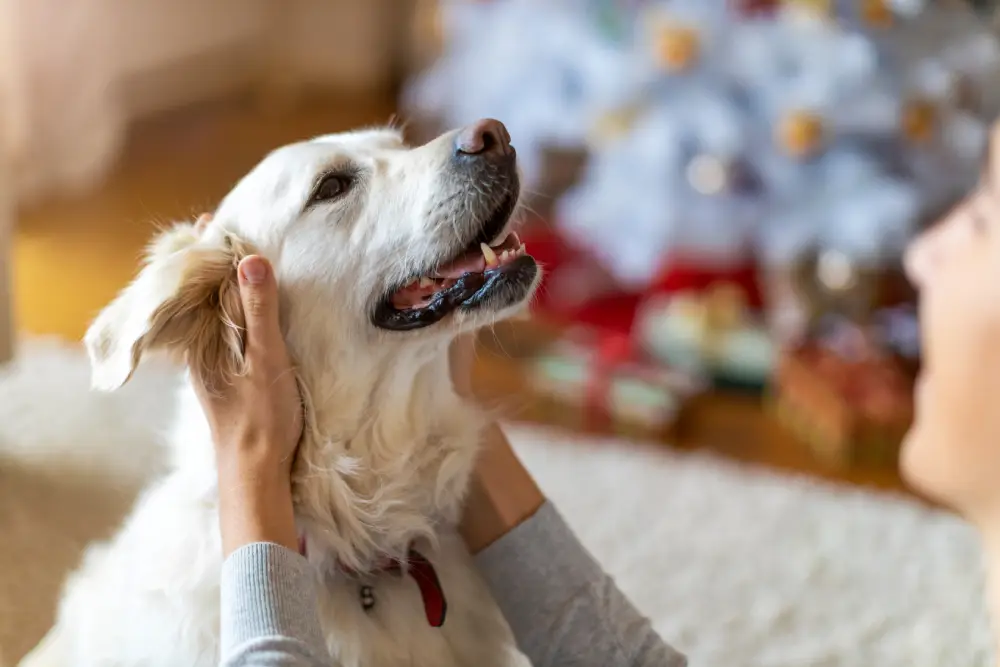
The lead up to the festive season may be considered enjoyable to many, but it can become a little overwhelming and stressful for our fur babies.
Introducing new pets, a change of scenery and an increase in house guests are all common contributors to increases in our four-legged friend’s stress levels. During the festivities, it is difficult to avoid these without impacting the festive fun, but there are ways in which you can help your furry companions to feel more relaxed.
Recognise the signs
The first step to helping your furry companion de-stress is getting to know the symptoms. In pooches, many of the symptoms are physically visible making them easier to spot. These include their tails hung low between their legs, their ears back and an increase in lip licking. Other signs include pacing, yawning, panting and unusual behaviour.
In felines, signs of stress may not be as obvious as they can easily be confused with other problems. Like dogs, pacing is one of the symptoms in cats, but effects may also occur in their day-to-day life. Your cat may become more withdrawn and out-of-sync from their usual routines. Their eating habits may change, they’re grooming habits may increase and their sleeping pattern is commonly disturbed. If your furbaby is one for snuggles but tends to be hiding and avoiding contact, distress may be the cause for the change in behaviour.
If you spot any of these signs, trying simple stress-relieving tactics can make a huge difference.
1. Comfort items
Providing your furbaby with a comfort blanket or a toy is perfect for stressful periods. A toy is a great distraction for your four-legged companions when they cannot be the centre of your attention. Separation anxiety is one of the main causes of stress in pets, but this can be avoided. Giving your pets a treat/toy before you leave can help comfort them while you are gone. If injecting this approach, it is important to remember to take this item back on your return; if this no longer feels like a luxury, it will not have the same effect when you need to scoot out. Creating a safe place for your companion may be all that is needed. Try putting a blanket over or inside an open crate with the toy. This way, when your furry friend is feeling stressed, they can retreat to their safe spot.
2. Creating relaxing environments
A relaxing environment will give your furbaby some time to settle after stressful situations. This can include relaxing sounds such as classical music and soothing scents. Pheromones and essential oils can help set a relaxing scene for your four-legged companion. These can be bought as plugins, diffusers and even on collars.
3. Exercise
Exercise is a great way for your pets to take-a-load-off. Not only do they enjoy it, but it is a great bonding technique and is extremely beneficial for maintaining their physical health. A wintery walk is great for some fresh air and offers time to clear the mind. Or, why not build an obstacle course for your furry friend in your garden? This way, you can also use it as a distraction and some quiet time when you have guests over. This is particularly beneficial for pets who suffer from noise or crowding stress.
4. Quality time
It is vital to remember never to scold a pet for behaviour changes due to stress. If you have a busy day planned, make sure you squeeze in some space for time with your pet upon your return. Spending some quality time with your pet is essential to avoid the feeling of neglect or loneliness. Enjoy some family time watching a movie together with a blanket and the fireplace on, or why not take part in some festive fun?
5. Food and water
Ensuring that there is plenty of food and water available extremely important. Any changes in your four-legged friend’s diet must be monitored and avoided where possible. Make sure to leave multiple water bowls around the house to avoid dehydration. If your furbaby is stressed, they may hide away from their usual spots. Using more than one water bowl ensures that no matter where your furry friend spends their day, there is easy access to water. If they’ve been good, reward them with their favourite treat or take them for a day out to a pet-friendly location.
6. Hide your emotions
Letting out your emotions is great stress relief, but it is important to remember that it may also impact your pets. Showing fear or sadness can also evoke similar responses from your companions. If you’re feeling sad when leaving your pets, try not to make this obvious. If you must leave and no one is home, try to leave quietly without alarming your pet as this may trigger panting and confusion. If your pet recognises a pattern such as picking up your keys or packing your bag before you leave, try mixing up your routine. Carry out these tasks before settling into other home-based activities to disassociate the tasks from departure.
If your pets are experiencing any unusual symptoms, please check with your vet to rule out any other medical conditions.
Got any of your own tips as a pet pawrent? Share them with us on Facebook.

Shop for Dogs

Personalise your search:
Shop for Cats

Personalise your search:
Our Most Popular Products


Webbox Lick-e-Lix with Beef Cat Treats 75g


Webbox Squeaky Ball Dog Toy



Webbox Lick-e-Lix Cheese & Taurine Cat Treats 75g


Webbox Lick-e-Lix Liver Cat Treats 50g


Webbox Lick-e-Lix Chicken Cat Treats 75g








